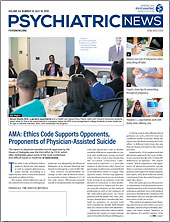This year’s APA Annual Meeting provided an informative primer on psychiatric medications and pregnancy in a session hosted by four powerhouses in the field: Jennifer Payne, M.D., and Lauren Osborne, M.D., the director and assistant director, respectively, of the Johns Hopkins Women’s Mood Disorders Center; Samantha Meltzer-Brody, M.D., M.P.H., the director of the University of North Carolina Center for Women’s Mood Disorders; and Veerle Bergink, M.D., Ph.D., who has just launched and directs a women’s mental health research program at the Icahn School of Medicine at Mount Sinai.
The quartet shared some practical tips and guidance for managing psychiatric conditions—particularly depression—in women patients before, during, and after pregnancy. An important caveat they emphasized, however, is that each patient’s case is different, so the following recommendations can be adjusted according to a patient’s needs:
•
Assume all women of reproductive age will get pregnant at some point, so raise the issue of birth control and discuss the importance of a planned pregnancy. This will make medication planning easier.
•
To optimize the baby’s wellness, discontinue any medications that can be discontinued and make any necessary medication switches before pregnancy. Change medications during pregnancy only when absolutely necessary.
•
To optimize the mother’s wellness, do not undertreat. Use the recommended therapeutic dose for all medications that are continued through pregnancy and monitor regularly.
•
In women with depression, prescribe second-generation antidepressants like selective serotonin reuptake inhibitors (SSRIs) and serotonin and norepinephrine reuptake inhibitors (SNRIs) over older medications like tricyclic antidepressants.
•
In terms of specific antidepressants, the panelists noted that most SSRIs and SNRIs are generally safe during pregnancy, though not entirely risk free. Consider avoiding paroxetine since it has been associated with very slight risks of birth defects.
•
For women with bipolar disorder, the panel advised stopping valproate and carbamazepine before pregnancy, or as soon as possible during pregnancy, since these medications increase the risk of neural tube defects. Lithium is safer, but blood levels during the first trimester should be kept low to reduce the risk of birth defects. Lamotrigine may be the safest option.
•
If a pregnancy is unplanned, do not panic. Taper medications you want to discontinue. Medication switches are not necessary since the baby has already been exposed.
•
Do not switch medications after birth because of concerns over drug concentrations in breast milk. Drug exposure through breast milk is lower than exposure during pregnancy, regardless of the drug. The exceptions are lithium, as it may lead to toxicity if a baby gets dehydrated, and clozapine, since it may induce agranulocytosis in babies.
•
For late-night feedings, discuss the option of bottle feeding over breastfeeding to help ensure the mother can get four to five hours of uninterrupted sleep, which reduces the risk of postpartum depression.
In addition to this treatment guidance, the panel recommended that psychiatrists take on the role of medical “communicator.” They should regularly update the mother’s other doctors such as her obstetrician/gynecologist or the child’s pediatrician to ensure there are no mixed messages related to maternal and infant care.
“What might be most important to remember is that the treatment plan during pregnancy is not your typical risk-benefit discussion,” Payne said. “This is a risk-risk discussion. Are there some risks with taking psychiatric drugs? Yes. But there are also significant risks of having maternal depression [and other mental health conditions] go untreated.” ■

